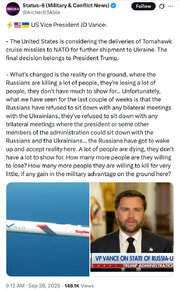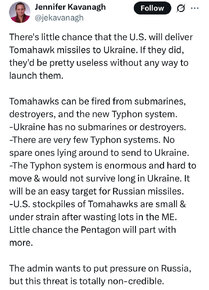- Thread Starter Thread Starter
- #12,881
An interesting piece from Zaluzhniy discussing the current state of affairs. Note he's talking largely about conditions on the front lines. He's also willing/able to admit the overall negative tendencies for Ukraine. At the same time he clearly thinks victory is possible for Ukraine, or at least wants to deliver the message that it is. He notably doesn't discuss the staffing issues Ukraine faces, only hinting at it when he talks about the possible end of the stalemate. Notably, he also doesn't trace the trend line of expanding drone capabilities to it's logical conclusion. Camera-equipped Shaheds have already appeared, the range of Lancets is considerably longer now, Orlan and Molniya drones are being used to seed FPV drones deeper behind Ukrainian lines, we saw our first wire-guided Molniya drone with allegedly a 40km range, and there are apparently Russian drones showing up with completely autonomous guidance. They're a nightmare for civilians, since it's unlikely they'll be good at distinguishing a civilian car from a SUV being used by Ukrainian Armed Forces. With manually guided drones we've seen Russian drone operators pausing and aborting when encountering civilians, but we've also seen strikse on vehicles that are simply assumed to be Ukrainian military. The far end of this is a situation where at least Russian, I suspect also Ukrainian, drones will be able to hunt vehicles at will for a depth of 100+ kms. Unless drone interceptors become sufficiently cheap and effective to be able to clear the skies over an area completely, it will mean the effective war zone will extend deeper and deeper. Cities like Donetsk, Severodonestk-Lisichansk, Sumy, Kharkov, and Zaporozhye will all be effected. We've seen the early phases of this start sort of already. Initially Ukraine had to rely heavily on man-power intensive drone-defense teams armed with mostly HMG technicals. Ukraine eventually gave up, the manpower requirements were too much, and the soldiers were needed at the front. Downing Russian Shaheds has become far less consistent since January. At the same time Ukraine's volume of strikes with longer ranged drones has increased to the point where Russia has had to go beyond traditional GBAD and start standing up their own drone defense teams in a similar manner, first a few but now many more. Russia has much more manpower, Ukraine generally has fewer long range drones to throw and far fewer missiles, and Russia has a functioning defense industry with good experience producing GBAD. As a result we have the Pantsyr-SMD with small anti-UAS missiles, we have the modern Flakturm in Russia, and we have Russian forces testing other options include the 2S38, a HMG-based solution with an EO system, and a domestic laser system. None are in widespread use though. We may see Russia finding a way to resolve this issue with some sort of technological solution. But if we don't, we may see Russia having to make the same decision about simply allowing many more Ukrainian drone strikes to get through eventually.

 zn.ua
zn.ua

Innovation as Core of Strategic Resilience: Denying Russia the Power to Dictate Terms Through War
Ukraine presented its defense innovations at DSEI-2025 in London. Valery Zaluzhny explains how drones, electronic warfare, and AI are changing warfare and why the current stalemate resembles World War I.




